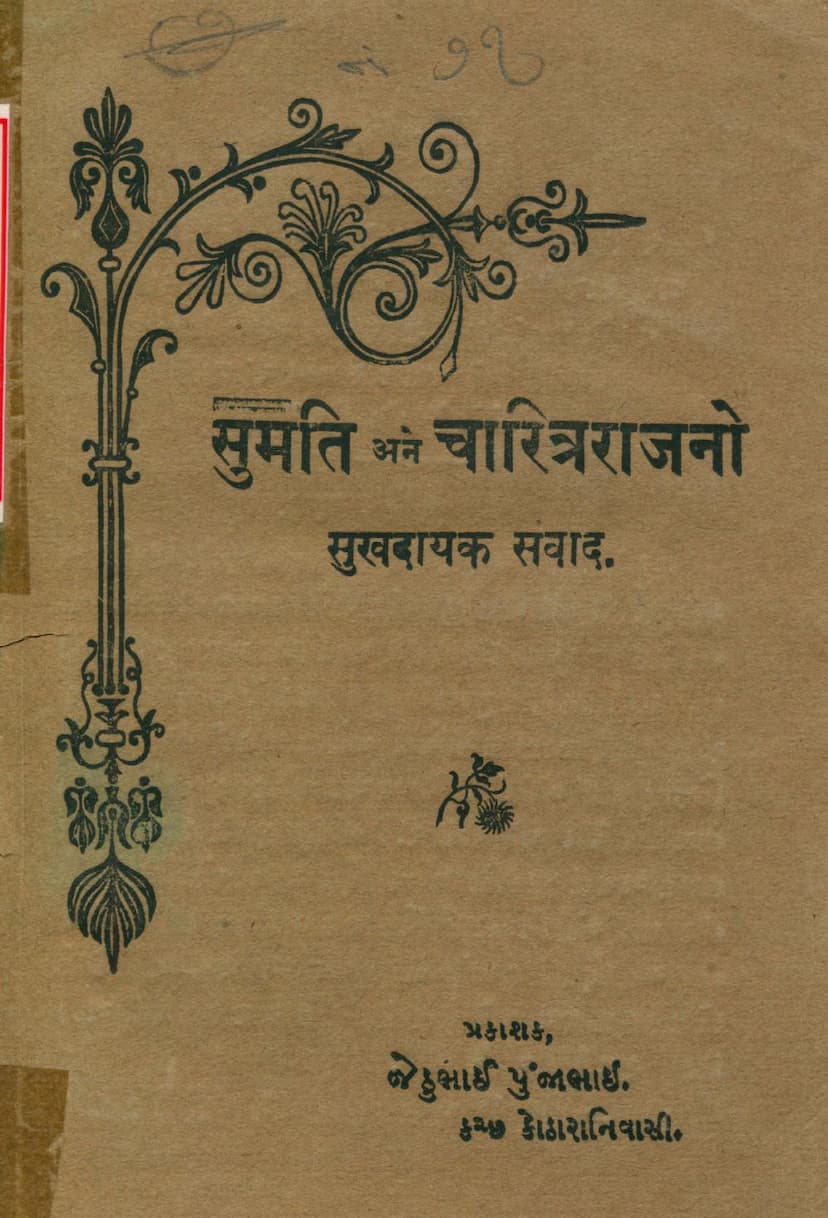Sumati Ane Charitrarajno Sukhdayak Samvad
Added to library: September 2, 2025

Summary
This document is a Jain text titled "Sumati Ane Charitrarajno Sukhdayak Samvad" (A Blissful Dialogue between Sumati and Charitra-raja), authored by Karpurvijay. Published by Jethubhai Punjabhai, it is presented as a free offering to spread spiritual knowledge.
The book begins with a "Vignapti" (Announcement) and "Agatya Suchana" (Important Information) advising readers to cherish the book, handle it with care, and share its teachings. It emphasizes that books gifted are not to be possessed but to be circulated for the benefit of many.
The "Anukramanika" (Table of Contents) lists the following sections:
- Shri Parshvajin Stavana (Praise of Lord Parshvanath)
- Shad-avashyak (Pratikraman) Stavana (Praise of the Six Essential Duties)
- Sumati Ane Charitra-rajo Sukhdayak Samvad (A Blissful Dialogue between Sumati and Charitra-raja)
- Amrut Veli ni Sajhay (A Song of the Creeper of Nectar)
- Vairagya Sar ane Upadesh Rahasya (Essence of Renunciation and Secret of Guidance)
- Prashnottare Madhye Pratikar (Questions and Answers on Remedies)
- Upadesh Tarangini Madhye Ubhavela Prashnottaro (Questions and Answers from the Wave of Guidance)
- Vividh Prashnottaro (Various Questions and Answers)
- Jivdaya athava Anukampa Daan (Compassion towards Living Beings or Generosity of Compassion)
The "Prastavna" (Preface) discusses the importance of knowledge for progress and how, in ancient times, knowledge was transmitted orally, but with the decline of such traditions, the necessity of written texts arose. It laments the loss of many ancient manuscripts due to neglect and superstition, highlighting the efforts of individuals like Bhavsingh Manek to promote printing. The preface mentions that this book, authored by Muni Karvijayji, features a dialogue between the personified virtues of "Sumati" (Good Sense/Wisdom) and "Charitra-raja" (King of Conduct). It also includes praise for Lord Parshvanath by Mahopadhyaya Shrimad Yashovijayji and praise for the Six Essential Duties by Vinayvijayji Vachak. The dialogue aims to guide Charitra-raja towards a virtuous path, discussing topics like the twenty-one methods to destroy negative tendencies, principles of conduct, distinguishing true deities, gurus, and dharma, the twelve types of asceticism, meditation, and more. It concludes by expressing hope for the author's continued contribution to spiritual literature.
The text then proceeds with the "Shri Parshvajin Stavana," a devotional hymn praising Lord Parshvanath, followed by the "Shad-avashyak Stavana," which expounds on the six essential Jain practices (Samayika, Chaturvinshati-stavan, Vandan, Pratikraman, Kayotsarga, and Pratyakhyana) through various verses and their merits.
The core of the book is the "Sumati Ane Charitra-rajo Sukhdayak Samvad." The dialogue begins with Sumati hesitantly approaching Charitra-raja, expressing her inability to speak openly due to reverence but wishing to impart some beneficial advice. Charitra-raja encourages her to speak freely. Sumati reveals that Charitra-raja has been neglecting her in favor of Kumati (Bad Sense/Ignorance). Charitra-raja admits his delusion and shame for his past actions, recognizing Sumati's importance. He expresses a desire to permanently align with Sumati and asks for her guidance on how to overcome Kumati's influence.
Sumati then provides Charitra-raja with twenty-one principles for self-improvement and purification, which include:
- Cultivating a broad-minded perspective instead of a narrow one.
- Moderating diet for health and bodily well-being.
- Practicing forgiveness and equanimity like the moon.
- Engaging in activities beneficial to oneself and others.
- Developing a soft heart instead of a hardened one.
- Fearing wrongdoing and respecting elders.
- Abandoning pretense and adopting simplicity.
- Practicing kindness to please elders.
- Cultivating modesty and self-restraint.
- Developing compassion and a benevolent outlook.
- Maintaining impartiality and avoiding favoritism.
- Being devoted to virtues rather than superficial qualities.
- Upholding truth even at the cost of one's life.
- Instilling spiritual discipline in family members.
- Thinking about the consequences of actions and acting with foresight.
- Self-reflection on one's identity, duties, and shortcomings, and seeking ways to improve.
- Seeking guidance from virtuous individuals.
- Showing respect to the virtuous.
- Never forgetting favors received and reciprocating them.
- Striving to help others selflessly.
- Acquiring skills and diligently practicing them.
The dialogue continues with Charitra-raja's deep appreciation for Sumati's wisdom. Sumati emphasizes the importance of the "tattvas" (truths) and the five qualities of "Samyak-darshan" (Right Faith): Upasham (Tranquility), Samveg (Renunciation), Nirved (Disgust with worldly life), Anukampa (Compassion), and Astikya (Faith in the principles). She elaborates on each quality, highlighting their significance in achieving spiritual liberation.
The book then transitions to other sections like "Amrut Velini Sajhay," "Vairagya Sar ane Upadesh Rahasya" (which contains numerous verses on detachment and worldly illusions), and various question-and-answer segments, including those from "Upadesh Tarangini" and "Vishheshavashyak." These sections cover a wide range of Jain philosophical concepts, ethical principles, devotional practices, and historical anecdotes.
The "Jivdaya athava Anukampa Daan" section underscores the paramount importance of compassion and selfless giving, citing examples of historical figures like King Kumarpal, Jagadusha, and Vikramaditya who demonstrated immense generosity and empathy, particularly during times of hardship.
The text concludes with "Shuddhipatraka" (Errata), "Shastra Kartru Ashish" (Blessings of the Scripture Author), and a list of donors ("Sthano Mubarak Nam"). The final blessings emphasize universal peace, well-being, and the importance of virtues like maitri (friendship), karuna (compassion), mudita (sympathetic joy), and upeksha (equanimity).